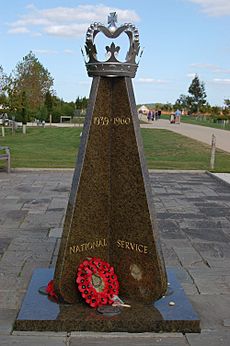National Service Act 1948 facts for kids
| Act of Parliament | |

|
|
| Long title | An Act to consolidate the National Service Acts, 1939 to 1947, and the Reinstatement in Civil Employment Act, 1944, so far as that Act applies to persons called up for national service after the thirty-first day of December, nineteen hundred and forty-eight. |
|---|---|
| Citation | 11 & 12 Geo. 6. c. 64 |
| Dates | |
| Royal assent | 30 July 1948 |
| Other legislation | |
| Repeals/revokes |
|
| Text of statute as originally enacted | |
The National Service Act 1948 was a special law passed by the UK Parliament. It made a system called "National Service" continue even after World War II ended. This meant young men had to join the armed forces for a period of time.
A similar law was first approved in 1947. It was supposed to start in 1949. But because of the Cold War and the Malayan Emergency, a new, stronger version of the law was passed in December 1948. It started just days later.
This 1948 Act was much like an earlier law from 1939. However, the 1948 Act made National Service a regular thing, even when the country was not at war. The older 1939 law did not do this.
The National Service Act 1948 applied to all healthy young men. Women did not have to do National Service. Also, men who were officially registered as conscientious objectors did not have to serve. A conscientious objector is someone who refuses to serve in the military because of their beliefs.
Contents
Why National Service Continued
In 1948, the British government realized it needed a bigger army. There were not enough volunteers. So, they started talking about a new National Service Act.
The first version of this law was approved in July 1947. It said that National Service would last for 12 months. It was set to begin on January 1, 1949.
However, the world changed quickly. There were money problems in the country. Also, the Cold War began, and there was a conflict called the Malayan Emergency. These events made the government change the law. The updated law was approved in December 1948. It still started on January 1, 1949.
How the New Law Was Different
The 1948 Act made some important changes from earlier laws:
- Age Range: The age for service changed from 18–41 years old to 17–21 years old.
- Service Time: The time young men had to serve increased from 6 months to 18 months.
- Reserve List: After serving, men stayed on a reserve list for four years. This meant they could be called back if needed.
- Reserve Call-ups: Men on the reserve list could only be called back for up to 20 days at a time. They could not be called back more than three times. Earlier laws allowed them to be called back for much longer periods.
The Act also changed which jobs were considered "essential services." People in these jobs did not have to do National Service. The new essential services were:
- Merchant Navy (working on ships)
- Farming
- Coal mining
Young men in these jobs were excused from National Service for eight years. If they left these jobs before turning 25, they could then be called up. Also, men from Northern Ireland were not called up for National Service. This was due to political reasons.
Changes During the Korean War
In October 1950, Britain became involved in the Korean War. Because of this, the service period for National Service was extended again. It went from 18 months to two years.
However, there was an exception. If a young man had been accepted into a university course for autumn 1950, he might not have had to serve the full two years. This meant very few people actually served only 18 months.
To make up for the longer service time, the reserve period was shortened by six months.
When National Service Ended
National Service slowly came to an end starting in 1957. The government decided that young men born on or after October 1, 1939, would not have to serve.
However, some men born earlier still had to complete their service. This was if their call-up had been delayed for any reason. The last men officially joined National Service in November 1960. All call-ups formally stopped on December 31, 1960. The very last National Servicemen left the armed forces in May 1963.
Calls to Bring It Back
Even after it ended, some people have suggested bringing National Service back.
- In 2015, Prince Harry talked about bringing back National Service.
- After his film Harry Brown came out in 2009, English actor Michael Caine also called for it to return. He believed it could give young people "a sense of belonging" instead of "a sense of violence."
 | Bayard Rustin |
 | Jeannette Carter |
 | Jeremiah A. Brown |


